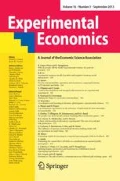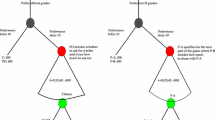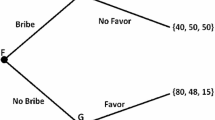Abstract
Using a simple one-shot bribery game simulating petty corruption exchanges, we find evidence of a negative externality effect and a framing effect. When the losses suffered by third parties due to a bribe being offered and accepted are high and the game is presented as a petty corruption scenario instead of in abstract terms bribes are less likely to be offered. Higher negative externalities are also associated with less bribe acceptance. However, framing has no effect on bribe acceptance, indicating that the issue of artificiality may be of particular importance in bribery experiments.
Similar content being viewed by others
References
Abbink, K. (2005). Fair salaries and the moral costs of corruption. In Proceedings of the conference on cognitive economics, Sofia.
Abbink, K., & Hennig Schmidt, H. (2006). Neutral versus loaded instructions in a bribery experiment. Experimental Economics, 9(2), 103–121.
Abbink, K., Irlenbusch, B., & Renner, E. (2002). An experimental bribery game. Journal of Law, Economics, and Organization, 18(2), 428–454.
Alatas, V., Cameron, L., Chaudhuri, A., Erkal, N., & Gangadharan, L. (2009). Subject pool effects in a corruption experiment: a comparison of Indonesian public servants and Indonesian students. Experimental Economics, 1, 113–132.
Andreoni, J. (1995). Warm-glow versus cold-prickle: the effects of positive and negative framing on cooperation in experiments. Quarterly Journal of Economics, 110, 1–21.
Bardsley, N. (2005). Experimental economics and the artificiality of alteration. Journal of Economic Methodology, 12, 239–251.
Bilotkach, V. (2006). A tax evasion—bribery game: experimental evidence from Ukraine. European Journal of Comparative Economics, 3(1), 31–49.
Brosig, J., Weimann, J., & Yang, C.-L. (2003). The hot versus cold effect in a simple bargaining experiment. Experimental Economics, 6(1), 75–90.
Branas-Garza, P. (2007). Promoting helping behavior with framing in dictator games. Journal of Economic Psychology, 28(4), 477–486.
Brandts, J., & Charness, G. (2000). Hot vs. cold: sequential experimental games. Experimental Economics, 2, 227–238.
Cameron, L., Chaudhuri, A., Erkal, N., & Gangadharan, L. (2009). Propensities to engage in and punish corrupt behavior: experimental evidence from Australia, India, Indonesia and Singapore. Journal of Public Economics, 93(7–8), 843–851.
Cason, T., & Mui, V. (1998). Social influence in the sequential dictator game. Journal of Mathematical Psychology, 42, 248–265.
Cookson, R. (2000). Framing effects in public goods experiments. Experimental Economics, 3, 55–79.
Cooper, D. J., Kagel, J., Lo, W., & Gu, Q. L. (1999). Gaming against managers in incentive systems: experimental results with Chinese students and Chinese managers. American Economics Review, 89(4), 781–804.
Eckel, C. C., & Grossman, Ph. J. (1996). Altruism in anonymous dictator games. Games and Economic Behavior, 16, 181–191.
Fehr, E., & List, J. (2004). The hidden costs and returns of incentives—trust and trustworthiness among CEOs. Journal of the European Economic Association, 2(5), 743–771.
Fehr, E., & Rockenbach, B. (2003). Detrimental effects of sanctions on human altruism. Nature, 422(13), 137–140.
Fehr, E., & Schmidt, K. (1999). A theory of fairness, competition and cooperation. Quarterly Journal of Economics, 114, 817–868.
Fischbacher, U., Gächter, S., & Fehr, E. (2001). Are people conditionally cooperative? Evidence from a public goods experiment. Economics Letters, 71, 397–404.
Güth, W., Huck, S., & Mueller, W. (2001). The relevance of equal splits in ultimatum games. Games and Economic Behavior, 37, 161–169.
Liberman, V., Samuels, S., & Ross, L. (2004). The name of the game: predictive power of reputations vs. situational labels in determining prisoner’s dilemma game moves. Personality & Social Psychology Bulletin, 30, 1175–1185.
Loomes, G. (1999). Some lessons from past experiments and some challenges for the future. Economic Journal, 109, F35–F45.
Oxoby, R. J., & McLeish, K. N. (2004). Sequential decision and strategy vector methods in ultimatum bargaining: evidence on the strength of other regarding behaviour. Economic Letters, 84, 399–405.
Rege, M., & Telle, K. (2004). The impact of social approval and framing on cooperation in public goods situations. Journal of Public Economics, 88, 1625–1644.
Ross, L., & Ward, A. (1996). Naive realism in everyday life: implications for social conflict and misunderstanding. In E.S. Reed, E. Turiel & T. Brown (Eds.), Values and knowledge (pp. 103–135). Mahwah: Lawrence Erlbaum Associates.
Schotter, A., Weigelt, K., & Wilson, C. (1994). A laboratory investigation of multi-person rationality and presentation effects. Games and Economic Behavior, 6, 445–468.
Svensson, J. (2005). Eight questions about corruption. Journal of Economic Perspectives, 19(3), 19–42.
Transparency International (2006). Global Corruption Report 2006.
Author information
Authors and Affiliations
Corresponding author
Electronic Supplementary Material
Rights and permissions
About this article
Cite this article
Barr, A., Serra, D. The effects of externalities and framing on bribery in a petty corruption experiment. Exp Econ 12, 488–503 (2009). https://doi.org/10.1007/s10683-009-9225-9
Received:
Accepted:
Published:
Issue Date:
DOI: https://doi.org/10.1007/s10683-009-9225-9




